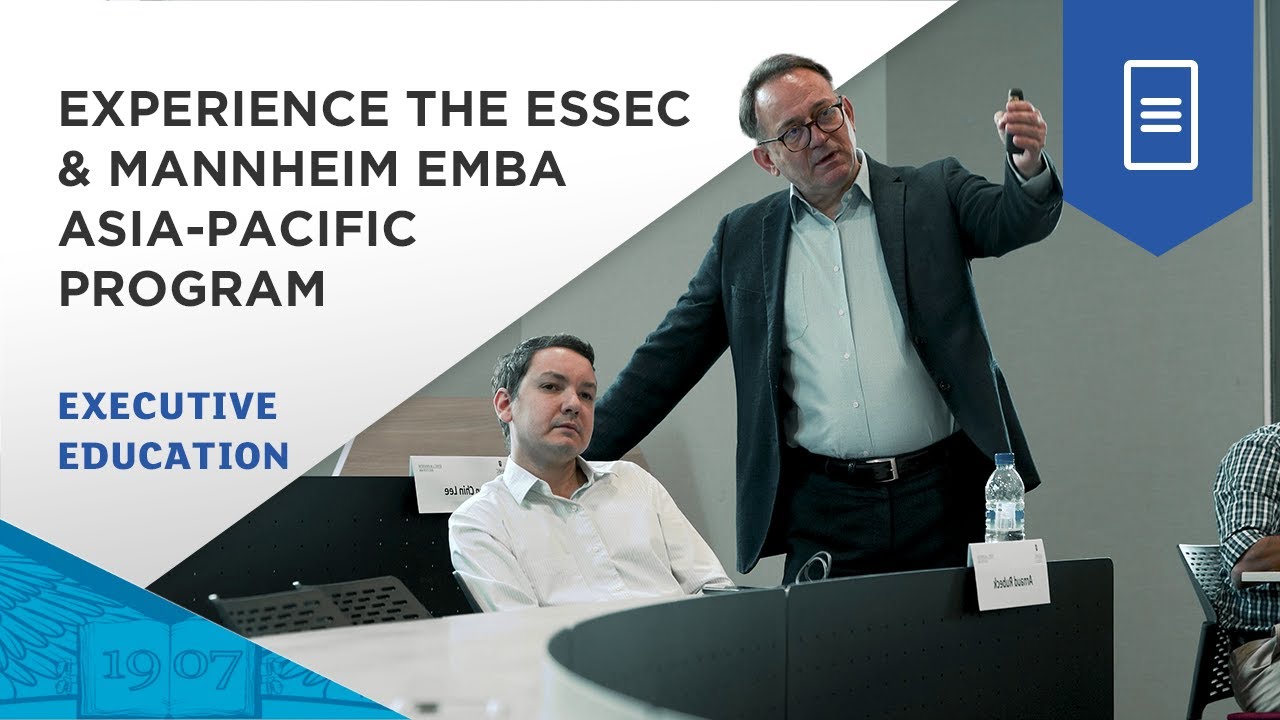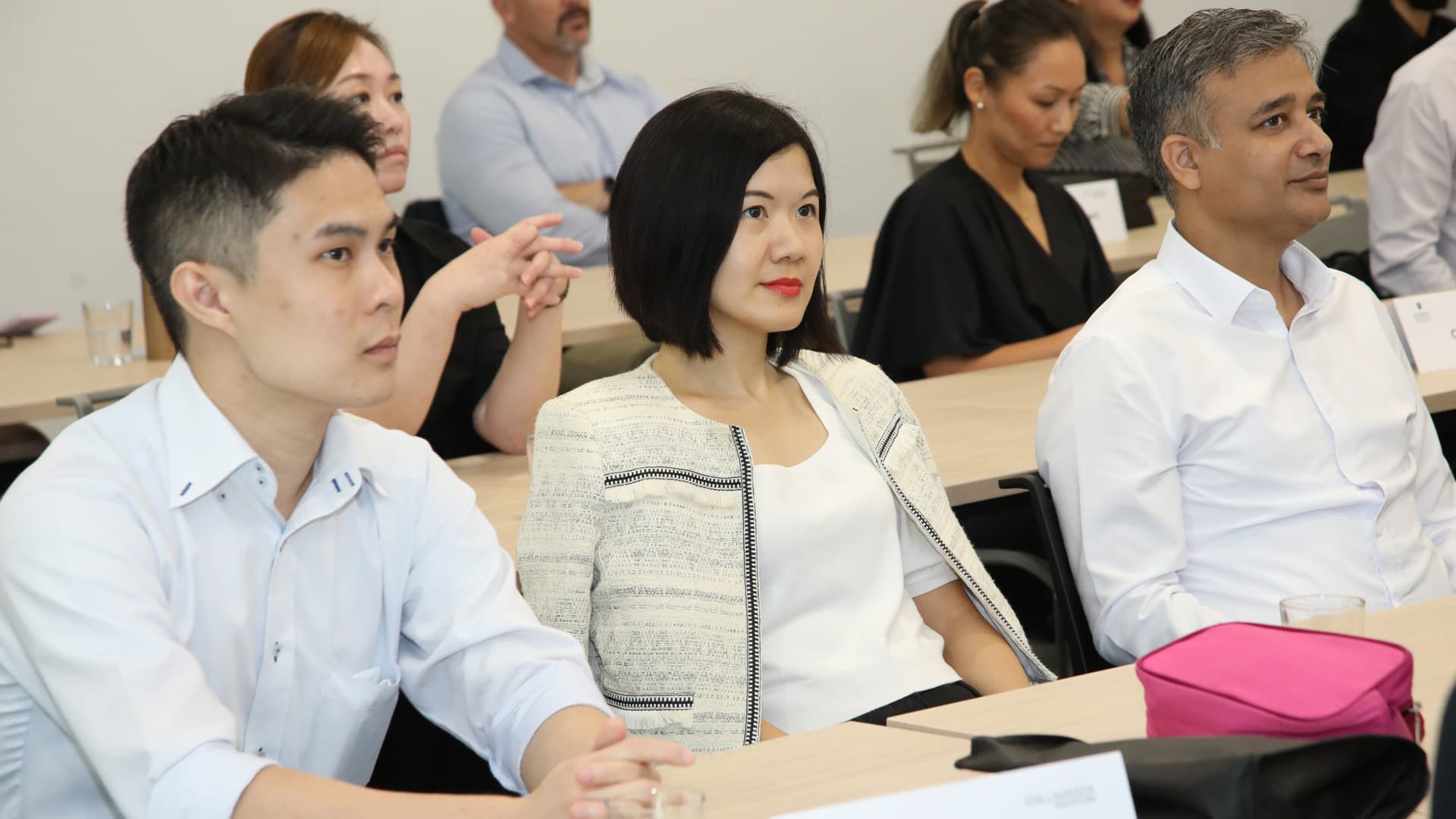
For senior executives looking to grow in the Asia-Pacific region, the ESSEC & Mannheim EMBA Asia-Pacific track brings together the best of the East and West for one to develop the leadership skills, cultural knowledge, and business acumen needed to thrive.
Bringing together the best of the ESSEC and Mannheim business schools, the program is ranked #18 by Financial Times EMBA Rankings and #9 by QS in the Joint EMBA Rankings. The program offers a practical framework for leadership—giving participants an edge in a competitive world where technological and social advances are altering how businesses operate.
The ESSEC & Mannheim Executive MBA enables participants to:
-
Develop a 360-degree view of business and expertise in all corporate functions
-
Share best practices among peers and gain first-hand insights into different industries and functions through a group work philosophy
-
Gain an international perspective on doing business through exposure to a variety of cultures and growing business markets
-
Enhance leadership skills in preparation for taking on top level jobs
-
Create and develop a valuable and lasting network of business partners and friends
-
Increase versatility and value employers, thus multiplying career opportunities
-
Acquire relevant knowledge and tools readily applicable to specific career challenges

|
An International Outlook with a pan-Asian Core where courses are delivered expertly by predominantly Asian faculty. The curriculum also covers 2 additional regional perspectives (Europe and North America) through residencies at Mannheim Business School, in Germany, and a partner university in the US. |
An Inclusive Approach with a strong focus on actionable learning and tactical frameworks applicable in the workplace, including a program-long group project on Innovation, Entrepreneurship, and Sustainability, which drives participants to develop start-up skills while also considering innovative business approaches and a view to sustainable / responsible practices. |
|
An Innovative Curriculum incorporating the latest business trends in topics such as Digital Transformation and Bottom of the Pyramid, Negotiating Business Deals in Asia, and Responsible Leadership & Sustainability. |
Uncover Your Value COVID-19 has sent the world into upheaval, and now more than ever before, the need is for leaders capable of helping navigate through uncertainties. As leadership opportunities arise, how will you distinguish yourself from your peers? |
- Senior executives with at least eight (8) years of professional experience, including three (3) years of managerial experience
- A good academic degree from a reputable institution (there is an additional process in place for non-degree holders)
- A track record showcasing excellent work performance and leadership potential
- Very good command of the English language (program entirely taught in English)
The business world is constantly moving and evolving at an unprecedented pace. We have identified a combination of Asian insights essential to consider while conducting business in the region and made sure that the program incorporates a broad range of courses to cover both soft skills and hard skills.
The ESSEC & Mannheim Executive MBA Asia-Pacific program truly equips established and up-and-coming leaders with the expertise to handle various challenges often associated with leadership positions.
ESSEC's educational approach is based on the participants' autonomy, responsibility, and freedom . ESSEC focuses on business experience and on the international arena to nurture the development of future graduates and give them a taste for innovation and entrepreneurship.
After taking the ESSEC & Mannheim EMBA Asia-Pacific program, I didn't just come across as another learning and talent development person. I could now speak the language of business and see things from a business perspective.
Head of Learning & Talent Management, Bank of Singapore, ESSEC & Mannheim EMBA Asia-Pacific Alumna 2015
This essential course introduces analytical methods and tools for investment, financing, and operating decisions critical to strategic leadership. Structured around compelling case, participants master capital budgeting using NPV analysis, capital structure optimization through Modigliani-Miller propositions, and payout policies including dividends and share repurchases. The curriculum emphasizes practical application through an individual company report where participants analyze their organization’s financial strategies, ESG factors, and value-creation opportunities. A company visit and business simulations bridge theory with real-world financial decision-making.

Positioning accounting as the “language of business,” this module gives non-financial managers the confidence to interpret and act on corporate financial data. Executives master fundamental principles, ratio analysis and short-term cash-flow management before tackling advanced topics such as financial reporting risk. An online primer accelerates pre-class readiness, while in-class case exercises and a final group analysis of a live company ensure concepts are applied to real performance challenges.

Positioned as a pivotal pillar of business architecture, this course explores operational excellence through Industry 4.0 technologies, strategic sourcing, sustainable operations and resilience planning. Real-world case studies and interactive simulations demonstrate coordination challenges and resilience strategies. Participants manage a global mobile phone supply chain in an immersive simulation, making decisions on demand forecasting, resource allocation, and disruption mitigation. The curriculum emphasizes sustainability integration, covering circular economy principles, covering circular economy principles and lean manufacturing applications. Grading blends class participation, case reports and a capstone team project that audits a live supply-chain process and recommends improvement initiatives.

A comprehensive, multi-disciplinary approach to driving organizational value creation through six critical business perspectives. Over six weeks, participants will master practical frameworks from leading Mannheim Business School professors covering Value-Based IT Management, Corporate Social Responsibility, Organizational Learning, International Taxation Strategy, Value-Based Marketing, and Modern Finance Functions. This self-paced online course equips executives with immediately applicable tools to optimize IT governance, implement sustainable business practices, build learning organizations, navigate complex tax planning decisions, develop customer-centric marketing strategies, and make data-driven financial decisions. The program combines cutting-edge academic research with real-world case studies and expert insights, enabling participants to holistically evaluate and enhance value creation across all aspects of their organizations while balancing stakeholder interests and long-term sustainability goals.

Prepares executives to recognize and manage the geopolitical forces that shape markets, alliances and regulatory environments across the Asian continent. Drawing on classical, critical and feminist schools of geopolitics, the module first equips participants with a rigorous conceptual toolkit—hard-, soft- and smart-power; territorial versus virtual space; the Thucydides Trap—to decode power dynamics among states, firms and non-state actors. It then moves to applied analysis of Asia’s most pressing flashpoints: Sino-Indian border tensions, South China Sea claims, Korea–Japan historical legacies, and the economic diplomacy of regional organisations such as ASEAN. Interactive lectures are paired with case workshops in which teams evaluate how territorial disputes, religious politics and demographic shifts translate into competitive threats or first-mover advantages for multinationals. Assessment blends a group briefings on an assigned regional disputes, in-class presentations to mock corporate boards and individual participation, ensuring every executive can communicate nuanced geopolitical risk recommendations to C-suite or board audiences.

Analyzing major Asian economies through historical and contemporary lenses, this course equips participants with tools to understand China’s rebalancing challenges, Japan’s economic evolution, India’s growth potential, and Southeast Asia’s development trajectories. Using frameworks like the Solow Growth Model and Heckscher-Ohlin trade theory, participants examine case studies through seminar-style discussions and a final essay foster critical analysis of geopolitical impacts on business operations.

Addressing the $3.9 trillion Islamic finance market, this module explores halal business strategies, Shariah-compliant financing, and marketing approaches for diverse Muslim populations. Case studies analyze market entry in Indonesia and Saudi Arabia, emphasizing socio-cultural and political-legal frameworks.

Designed for both corporate intrapreneurs and startup builders, this hands-on module cultivates an entrepreneurial mindset through guided discovery interviews, iterative experimentation and live founder dialogues. Participants learn to identify unmet market needs, de-risk early-stage ideas and compare four dominant corporate innovation models—evaluating their trade-offs, governance requirements and strategic risks. Instead of traditional exams, executives conduct a critical interview with a startup founder and deliver a reflective analysis that links theory to real venture journeys, sharpening their ability to navigate uncertainty and drive 0-to-1 growth initiatives.

The program’s capstone requires teams to develop ventures addressing environmental/social sustainability challenges with uncertain demand. Teams conduct field research—problem discovery interviews, controlled experiments, and iterative prototyping—for intrapreneurial or startup concepts. Evaluated through mid-project and final presentations, this experience emphasizes adaptation to unfamiliar markets, as seen in projects like sustainable tea estate management and ethical tourism initiatives.

This immersion module explores data-fueled organizations through contemporary case studies. Participants master AI implementation, KPI design, and AB testing while addressing data governance challenges in Asian tech ecosystems.

Focusing on value creation in the platform era, this three-day intensive equips leaders with practical tools such as the Business Model Canvas and Value Proposition Canvas to reinvent—or defend—their value propositions. Executives explore archetypal digital models, analyze ecosystem disruptions and participate in a workshop that stimulates creative problem-solving. The program culminates in a Digital Business Model Innovation Challenge where teams pitch transformation roadmaps to peers and faculty, sharpening their ability to capture new digital revenue streams.

This immersive course demystifies disruptive technologies—from AI and big data to cloud computing and platform analytics—and challenges executives to harness them for inclusive growth. Through interactive lectures, guest-expert sessions and a corporate visit to a leading digital innovation hub, participants dissect sector-shaping case studies and craft strategies that extend high-impact solutions to underserved markets. A capstone group project tasks teams with designing a digitally enabled business concept that profitably addresses bottom-of-the-pyramid needs, fostering both commercial acumen and social responsibility.

Explores how brands are built, experienced and measured in always-on digital ecosystems.
Across six sessions, the course contrasts traditional versus digital media paths to value, decodes online word-of-mouth dynamics and teaches executives to craft data-driven campaigns. Hands-on group activities examine website value propositions, YouTube engagement tactics and TripAdvisor review mining, while Harvard/Ivey cases analyse DTC disruption and metaverse commerce. A final agency-style pitch requires teams to sell a comprehensive digital campaign backed by analytics KPIs.

Frames marketing as a profit engine in volatile Asian markets.
Delivered by dual faculty, the module mixes lectures, guest sessions on pricing power, luxury-brand site visits and evidence-based “marketing laws” workshops. Teams build a go-to-market plan for a brand extension, specifying segmentation, value proposition, omnichannel mix and ROI metrics. Creativity and empirical justification are rewarded in the culminating pitch and revised deck submission.

Translates well-crafted strategies into aligned, measurable actions. Focusing on organisational alignment, change management and balanced-scorecard design, the course blends concept briefings with in-class exercises and board-level case analyses. Teams present execution blueprints that incorporate ESG metrics and stakeholder governance. Individual performance is gauged through six real-time problem-solving tasks and contribution to plenary discussions.

Builds the analytical and interpersonal toolkit for crafting competitive advantage in high-growth contexts. Using contemporary business cases, participants master industry analysis, corporate-scope decisions and global expansion challenges before stress-testing them in a multi-team leadership simulations. Heavy weighting on class debate encourages persuasive, data-backed argumentation; short team debriefs cement take-aways for immediate workplace application.

Cultivates the intra- and interpersonal intelligence needed to manage diverse talent for innovation.
Through MBTI-based self-diagnostics, group exercises and case debates (e.g., IBM’s “Diversity as Strategy”), executives learn to recognise diversity “flipsides,” build inclusive reflexes and integrate D&I metrics into firm-wide talent pipelines. Assessment balances active participation, an individual reflection and a group presentation that audits an organisation’s inclusion practices and proposes measurable improvements.

The online course will be taught by professors from Mannheim Business School, covering different perspectives on a chosen topic

Participants will get to embark on one-week residency in ESSEC Business School (France), Mannheim Business School (Germany) and Georgetown University (United States)

A leading pioneer in education since 1907 and ranked # 6 business school in Europe by the Financial Times. ESSEC holds the prestigious “triple crown” accreditation from AMBA, EQUIS, and AACSB. We offer a wide range of top-ranked programs that provide strong global exposure, professional networks, and career outcomes. Students can choose to study on three continents via our global campuses in Singapore, France, and Morocco. In helping our graduates advance their professional aspirations, we have produced business leaders who helm some of the world's most influential organizations, such as Accenture, PwC, UBS, Chanel, L'Oréal, and Van Cleef & Arpels.
We serve to establish strong links between our participants and international companies on various levels so that all can benefit from the transfer of knowledge.
With more than 65,000 alumni in 65 capital cities, ESSEC is proud of its strong and influential alumni network worldwide. Our alumni also value strengthening their network and widening their career opportunities through their associations within an active alumni community.
“The ESSEC & Mannheim EMBA Asia-Pacific filled the gap for me as it framed the HR strategies, showed the different models that companies use, and gave me an avenue to ask all the questions I needed. The beauty of the EMBA is in its interactive nature. Unlike in a traditional classroom, the emphasis is on information synthesis, not download. Lessons are discussion-centric, with an abundance of opportunities to brainstorm and question.”
ESSEC & Mannheim Executive MBA Class of 2021
Head of Digital, International Fuels & Lubricants at Chevron
Contact our EMBA program advisor Allea Francisco via email or schedule a a one-to-one discussion.
Start your application for the ESSEC & Mannheim Executive MBA (Singapore Track).
Admissions Jury
Shortlisted candidates are invited to attend their official Jury in Singapore or via video conference, during which candidates will have the chance to present themselves in person, and go deeper into their motivations for attending the program.
Candidates will be notified of the outcome 1-2 weeks after the Jury. Candidates who receive their acceptance package will have 1 week to respond.
Description
Scholarships will be awarded to meritorious candidates in each class whose background, work experience, achievements, and personal profile contribute to the school's breadth and depth of diversity. There will be balanced considerations of both merit and financial needs. This award is open to all nationalities.
Description
The Singaporean Future Leader Scholarship is awarded to Singaporean candidates based on merit and the quality of his/her essay. It will be on a first-come-first-served basis.
Description
The Women Leader Scholarship is awarded to the selected female candidates based on merit and the quality of her essay. The committee will base its decision on the candidate’s essay and profile.
Description
The Early Bird Scholarship will be awarded to a limited number of applicants who have accepted the admission offer and made the first payment before the respective deadlines. This award is open to all nationalities.
Value of the Award: 15% by 30 April / 10% by 30 June
fevrier
11
2026
WHEN TITANS CLASH, Southeast Asia Business Geopolitics in the Age of US-China Rivalry
11:30 AM - 1:00 PM | ESSEC APAC Campus, One North, Singapore
mars
5
2026
Navigating Aviation’s Next Era: Growth, Risk and Reinvention
12:30 PM - 1:30 PM | Mandala Club 31 Bukit Pasoh Rd, Singapore 089845















